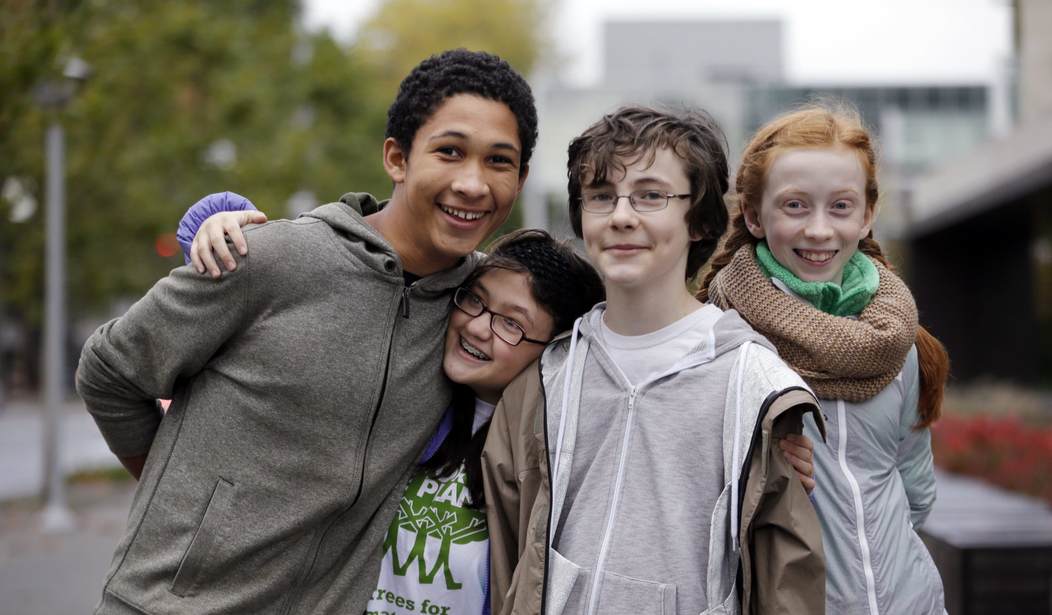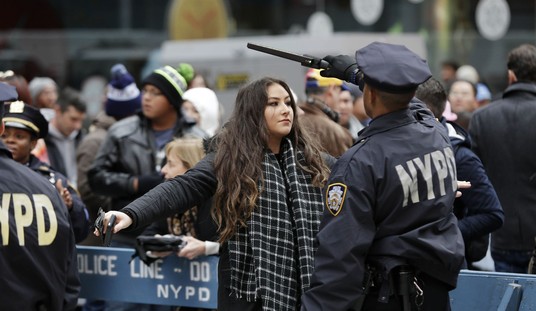A ruling from a Washington state judge asserts state lawmakers have a “constitutional obligation” to act on global warming. More specifically, an obligation to the youth.
King County Superior Court Judge Hollis R. Hill ruled in favor of eight “youth petitioners” in a lawsuit against the Washington Department of Ecology.
Here’s the backstory: in August, children backed by the massive treasure of the environmental movement started filing lawsuits against the state of Washington and Oregon to force them to act on global warming.

In this photo taken Wednesday, Oct. 28, 2015, teenage environmental activist Aji Piper, 15, holds up a tee shirt he was symbolically presenting to Bill Gates as he stands with Wren Wagenbach, 14, right, and Lara Fain, 13, and other youth after a rally in Seattle. The three are among eight youth activists who petitioned Washington state last year to adopt stricter science-based regulations to protect them against climate change. (AP Photo/Elaine Thompson)
“The purpose of the case is to protect our rights,” Tia Marie Hatton, an 18-year-old plaintiff from Oregon, told MSNBC. “They depend on a healthy climate and right now that healthy climate is being negatively impacted by the government allowing and promoting the use of fossil fuel.”
“Different rivers and creeks are drying up, and having them get warmer, it gets more algae into them. So it’s like really gross to swim in them,” added Avery McCrae, an 11 year old who’s also from Oregon.
“We’re the ones who have to live with it if the oceans are acidic and the planet is 5 degrees warmer,” said Washington’s Gabriel Mandell, 13, an eighth-grader and plaintiff in the case. “The snowpack is melting. Ocean is acidifying. The Earth is warming. Everything that can go wrong is going wrong, and we need to fix it.”
The judge’s ruling explained: the tots’ “very survival depends upon the will of their elders to act now, decisively and unequivocally, to stem the tide of global warming…before doing so becomes first too costly and then too late.”
Judge Hill based his decision on the public trust doctrine which he interpreted to mean that the state has a “mandatory duty to act.”
“The state has a constitutional obligation to protect the public’s interest in natural resources held in trust for the common benefit of the people,” the ruling said.
As if this weren’t strange enough, Hill tossed in a reference to the United Nations climate talks in Paris and said: “If ever there were a time to recognize through action this right to preservation of a healthful and pleasant environment, the time is now.”
Putting on his “scientific expert” hat, the judge explained that current carbon rules “cannot ensure the survival of an environment in which [youth] can grow to adulthood safely.”
According to The Blaze: “The youth were represented by Our Children’s Trust, which describes itself as a ‘global human rights and environmental justice campaign;’ the Western Environmental Law Center, which describes itself as combining ‘legal skills and sound conservation biology;’ and Plant for the Planet, which describes itself as a group that ‘connects children around the world as ambassadors for climate justice.'”
What can the state do to stop global warming or climate change? Who knows.









Join the conversation as a VIP Member